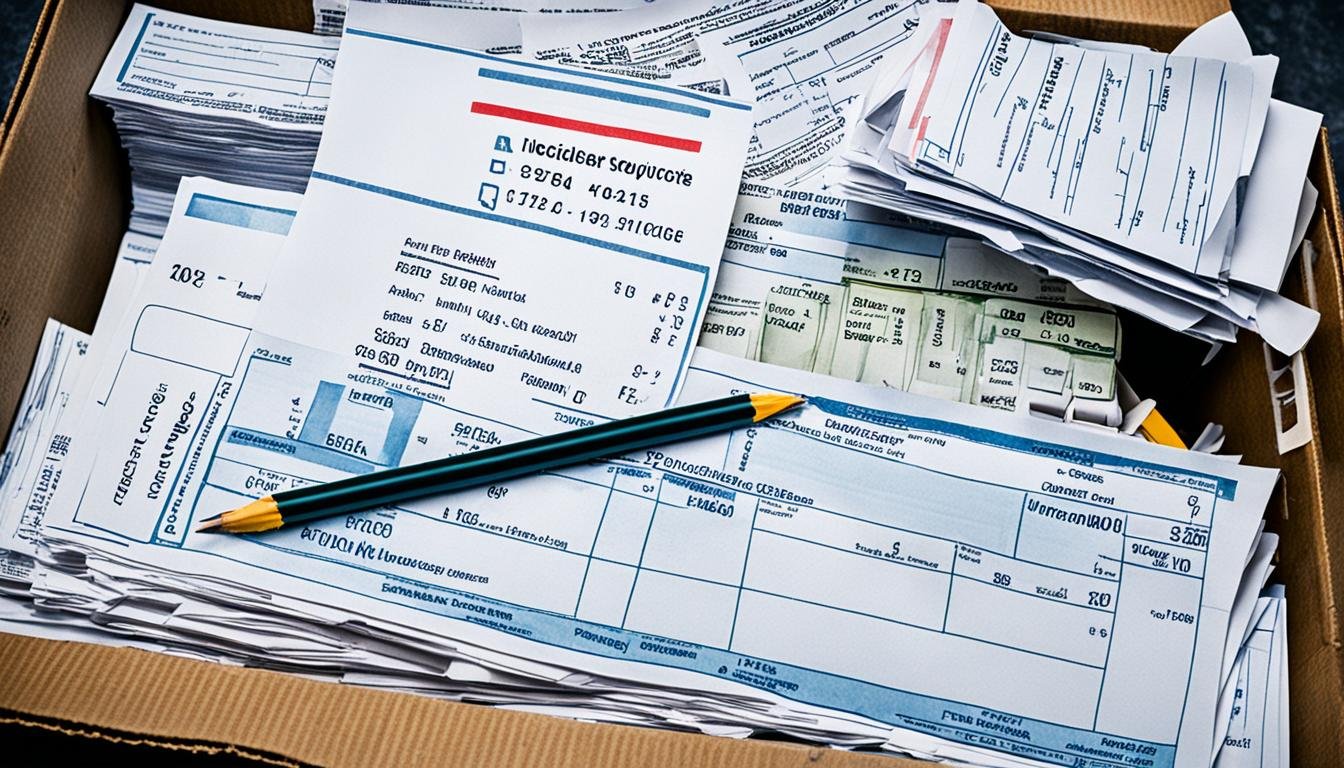Taxation Essentials for Small Business Owners
Did you know small businesses make up over 44% of economic activity in the United States? Running a small business has many challenges. One big challenge is managing taxes, which are vital for success.
We’ll look at key tax practices for small business owners. This includes tax planning, understanding deductions and compliance. It’s all about managing your taxes well.
Key Takeaways:
- Managing taxes is an important aspect of running a successful small business.
- Understanding tax planning, compliance, and implications is crucial.
- Maximizing deductions can help reduce your tax burden.
- Working with an accountant throughout the year can provide valuable guidance.
- Proper record-keeping and separating personal and business finances are essential.
The Role of Your Accountant in Tax Preparation
Having an accountant for your small business is more than just tax filing. They help you year-round with tax laws and how best to use your money. A good accountant is a key partner in your financial success.
An accountant helps you keep track of money coming in and going out. This helps with accurate tax reporting and finding tax benefits you might have missed.
They also keep your cash flow steady, aiding in budgeting and forecasting your finances. This supports your business in making smart financial moves to stay profitable.
Accountants keep an eye on profits, too. They analyze your financial health, pointing out what’s working and what’s not. This insight helps to increase profits and grow your business steadily.
Getting the right accountant from the beginning is crucial. They assist in setting up financial processes and making sure you follow tax laws. Their help builds a strong financial base for your business’s future.
Tax work is an ongoing effort, not just a yearly task. With a knowledgeable accountant on your side, you’ll be ready for tax times and avoid financial bumps.
“Your accountant is your trusted advisor who can help you optimize your tax strategies and make informed financial decisions.”
Utilizing An Accountant for Effective Tax Planning
Your accountant does more than just prepare taxes. They also help plan your taxes for the best financial outcomes. Together, you look for ways to cut tax costs and maximize benefits.
| Benefit | Description |
|---|---|
| Identification of Deductions | Your accountant can find tax deductions that fit your business, saving you money. |
| Tax Compliance | They help you follow tax laws, keeping you safe from fines and audits. |
| Strategic Business Decisions | Accountants give you financial info to make smart choices, considering tax effects. |
| Year-round Support | With an accountant always available, your business can manage money effectively all year. |
Tax planning gets more critical as your business grows. Your accountant can guide you in using tax laws to your advantage while staying compliant.
Reporting Income and Matching 1099s
Small business owners must report their income accurately and match their 1099s. This keeps them in line with IRS rules. It’s a must, not just to follow the law, but to steer clear of IRS audits. Make sure the income you tell the IRS reflects what the 1099 forms say.
The IRS checks your reported income against what’s on the 1099 forms from your clients. If your reported income and the 1099s don’t match, it can cause troubles. Remember, you still need to report income even if you don’t get a 1099.
Matching your 1099s with your income reports helps the IRS see your earnings clearly. It can stop audits and penalties before they begin. Always double-check the 1099 forms you get to make sure they add up with your income records.
“Properly reporting your income and matching 1099s are critical steps to avoid potential tax issues and maintain a smooth relationship with the IRS.” – [Accounting Firm Name]
Let’s look at an example of matching income with 1099s:
| Client Name | Income Reported by Client | 1099 Received | Matched Income? |
|---|---|---|---|
| ABC Company | $10,000 | $9,800 | No |
| XYZ Corporation | $5,000 | $5,000 | Yes |
| Total | $15,000 | $14,800 | No |
In the example above, a client reported earning $15,000, but their 1099s showed $14,800. Such differences catch the IRS’s eye. It’s key to fix these errors by talking to your clients to get the right amounts on the 1099s.
Thoroughly matching 1099s with your reported income ensures your tax return is correct. This method can help prevent audits and avoid tax troubles. Stay ahead by being proactive and careful in these reports.
Importance of Thorough Record Keeping
Record keeping is key when doing taxes. It helps you be accurate and get all your deductions. Small business owners need to be careful with their financial records. This avoids audits and uses all possible deductions.
“Keeping records is vital for your business and taxes,” says Jane Davis, a CPA.
Small business owners must keep track of what they earn and spend all year. They need to save invoices, receipts, and other business papers.
Using accounting software helps a lot. It makes keeping records easier and more organized. Popular choices like QuickBooks, Xero, and FreshBooks can do a lot for you. They track costs, send invoices, and help with balancing your accounts.
This software lets you see important reports and your money flow easily. It helps owners understand their finances better. Good records help make smarter business moves for growth.
Keeping great records means less tax and maybe fewer audits. It shows the IRS where your money went. This makes claiming deductions less stressful.
“Keeping good records is your best defense in an audit,” advises Davis. “It makes things go easier if you’re prepared.”
Below is a chart about audits and record keeping:
| Record Keeping Practice | Audit Risk |
|---|---|
| Thorough and Accurate Record Keeping | Low |
| Inadequate or Incomplete Record Keeping | Medium to High |
Havieng good and complete records greatly cuts down your audit risk. The IRS recommends keeping records for at least three years.
To wrap up, keeping good records is critical for small businesses. It ensures correct tax filings and lowers audit chances. With good record keeping and the right software, running your business is smoother. You can focus on its growth.
Separating Personal and Business Finances
Small business owners should keep personal and business finances separate. Mixing the two can lead to messy money and trouble during audits. It’s better to have different bank accounts and credit cards for your business to track your money properly and show where it goes.
A separate business bank account makes it easier to see what you’re spending and earning. This way, you can clearly know your business’s financial health. It also makes it simple to claim tax deductions because you’ve already put things in the right categories.
Keeping personal and business money apart not only helps with managing your money better. It also shows that your business is its own, separate thing to the IRS and others.
Keeping personal and business finances apart is key for tax rules and less audit risk.
Doing this also protects your personal money if your business gets in a tight spot. It keeps your money safe from any problems with your business’s debts or legal troubles.
This practice also makes running your business smoother and saves you time on bookkeeping. You won’t have to spend time separating out which costs were for your business. This makes working with an accountant simpler and more accurate.
Benefits of Separating Personal and Business Finances
There are many benefits to having separate personal and business accounts:
- Keeps your financial records clear and organized.
- Makes tax filing easier because business expenses are already sorted.
- Helps you see how your business is doing financially.
- Makes your business look more professional and credible.
In conclusion, keeping personal and business finances apart has a lot of upsides. It lets you keep better records, follow tax rules, protect your personal assets, and run your business more smoothly. Starting with this good habit lays a strong base for your business’s future financial success.
Understanding Gross and Net Profits
Small business owners must know the difference between gross income and net income. These numbers are key in knowing how profitable and how much a business is growing.
Gross income, or total revenue, is all the money brought in from sales and business activities. This is the total income before there are any deductions for expenses.
“Gross income is like the top line of your business’s financial statement. It’s the overall amount of money your business brings in.”
Net income is what’s left from the gross income after all costs are taken out. Costs include operating costs, taxes, salaries, and other business expenses. It’s called the “bottom line” because it shows the business’s final, actual profit.
For business owners, calculating net income is very important. It gives an exact look at how profitable the business is. This figure shows if the business is doing well financially, allowing owners to make smart choices for growth.
Knowing about gross and net profits helps business owners with key decisions. It can guide them in setting prices, cutting costs, and finding ways to increase revenue. This can lead to a higher net income and better long-term success for the business.
Classifying Your Business for Tax Purposes
Choosing the right business type is key for tax reasons. It’s important to know how each type (like C Corp, S Corp, LLC, or sole prop) affects taxes.
It’s smart to talk to a lawyer and an accountant. They can help pick the best type for your business. They look at your specific situation to guide you.
“Choosing the right business classification is like laying a solid foundation for your tax strategy. It sets the stage for how your business will be treated by the IRS and determines the kind of tax burden you will carry.”
Let’s explore the tax impacts of different business structures:
1. C Corporation
C Corps are their own legal entities. They can sell stocks and gain funds. But, they face double taxes on their revenue. Both the business and its owners pay taxes on profits.
2. S Corporation
S Corps combine the perks of limited liability and pass-through taxes. This means the business’s profits or losses go to the owners’ personal tax returns. It’s a good choice for small businesses cutting down on taxes.
3. LLC (Limited Liability Company)
LLCs mix the safety of a corporation with the easy-going rules of a partnership. They let business owners choose their tax structure, like filing as a sole prop/partnership or an S Corp.
4. Sole Proprietorship
Being a sole proprietor means you and your business are one. You report your business’s finances on your personal tax forms.
Picking the best type means looking at tax issues and where you see your business going. Talking to experts helps you choose wisely.
| Business Structure | Tax Implications |
|---|---|
| C Corporation | Subject to double taxation; corporate and shareholder taxes. |
| S Corporation | Pass-through taxation; income flows through to shareholders’ personal tax returns. |
| LLC (Limited Liability Company) | Flexible taxation options; can be taxed as a sole proprietorship/partnership or as an S Corporation. |
| Sole Proprietorship | Owner reports business income and expenses on their personal tax return. |
Payroll Services and Tax Compliance
Hiring a trusted payroll service is key for small businesses. It helps them meet payroll tax rules. Often, using unknown services leads to not paying payroll taxes. This can bring penalties and extra charges. So, picking a solid and known company for this service is vital.
Working with a top-notch payroll team has its perks. They handle all the tricky payroll math. This includes taking out taxes, figuring employee cuts, and adjusting to tax rate changes. This means fewer mistakes and on-point payroll, which saves time and keeps penalties away.
Good payroll teams keep up with all tax laws. They make sure your business stays in line. They deal with filing and paying your taxes, like Social Security and Medicare, for you. Cutting this duty off your list lets you focus on your business without worrying about payroll tax errors.
The IRS always keeps an eye on payroll tax payments. Missing or late payments can cause big trouble. By letting a known payroll service handle your taxes, you can be confident. They will do it right, and you’ll stick to the laws.
Putting money into a solid payroll service does more than help with taxes. It makes payroll smoother and efficient. This move saves you time and resources. It lets you concentrate on growing your business.
| Benefits of Hiring a Reputable Payroll Service |
|---|
| Expertise in payroll tax calculations and deductions |
| Updated knowledge of payroll tax laws and regulations |
| Accurate filing and payment of payroll taxes |
| Reduced risk of payroll tax penalties and interest charges |
| Efficient and accurate payroll processing |
| Time and resource savings for small business owners |
Teaming up with a trusted payroll service gives small business owners peace of mind. They know their taxes are in expert hands, staying compliant with the rules.
Utilizing Your Accountant’s Expertise in Business Growth
A good accountant is key to your small business’s success. They do more than just your taxes. They offer advice on finances that deeply impact your business. This includes everything from saving for retirement to smart business investments. Your accountant can guide you in making wise financial decisions. Let’s look at how they can help your business grow.
1. Retirement Contributions
Your accountant can help you figure out the best retirement plan for your business. They might suggest plans like SEP IRA, SIMPLE IRA, or individual 401(k). With their help, you can boost your retirement savings. Doing this not only secures your future but might also bring tax benefits today.
2. Bonuses and Delayed Compensation
Deciding on bonuses or delaying pay? Your accountant has insights. They’ll help you understand the financial effects of each choice. Knowing when to give bonuses and how to delay pay smartly can improve your business’s financial health.
3. Cost-Saving Strategies
Looking to save money in your business? Your accountant can find ways to lower costs. They’ll review your spending and suggest smart cuts. Maybe they’ll advise buying property over renting. Or they could find tax breaks for your business investments. These tips can save you money without lowering your product or service quality.
“Your accountant’s advice can drive your business’s financial health and growth.”
Working closely with your accountant as a trusted partner can lead to smart financial decisions. It’s about using their expertise in financial planning, retirement strategies, and business investments. Together, you and your accountant can build a strong financial plan for your business to thrive in the long run.
Imagine what a piece of advice from your accountant could do for your business:
| Scenario | Recommendation |
|---|---|
| Thinking of buying new equipment for your business. | Your accountant suggests looking into Section 179 deduction. It lets you deduct the full equipment cost from your business income. This could lower your taxes and allow you to invest in your business’s future. |
Advice from your accountant, as seen in this example, can directly benefit your business’s finances. This, in turn, supports the growth of your business.
Capital Assets and Tax Deductions
When you run a business, you often need to buy things like property or equipment to work well. The good part is these buys can lead to big tax breaks for your business. Knowing the rules on how to handle these items can let you take full advantage of these deductions. This could mean less tax to pay.
Getting advice from your accountant is key to using these tax breaks fully. They can guide you through the complicated tax laws. They will help you figure out the best way to handle your business’s capital assets for taxes.
Understanding Tangible Property
Tangible property means physical things your business uses, like machines, cars, desks, and tools. You can buy or rent these items. But, things like patents have a different tax status and might not get the same deductions.
It’s very important to correctly label and record these physical assets you buy. The IRS has clear rules on what counts as just a regular business cost and what should be treated as a major buy.
Capitalization versus Deduction
The IRS wants businesses to treat most big spending on stuff or its fixing up as major buys. This means spreading out the cost over many years. Each year, a part of the cost can be taken as a deduction thanks to this.
Yet, everyday costs in business might be fully deducted right away. These are the costs without which your business can’t run daily. But usually, they don’t add long-lasting value to your business.
Properly capitalizing your assets can provide long-term tax benefits. However, it’s vital to work closely with your accountant to ensure that you comply with the IRS guidelines and maximize your deductions.
Depreciation and Tax Deductions
Depreciation is how the cost of an item is spread over its useful life. This means you can cut some of this cost from your taxes every year. The IRS has set ways to do this, such as the MACRS system.
By claiming these depreciation deductions, you get to cover the cost of your items over time. You still get to use these things for your business while saving money on your taxes. Your accountant will help you pick the best way to do this for each item you own.
Consult Your Accountant
Capital assets and tax deductions can get really complex. It’s smart to ask your accountant before you make big buys or claim taxes. They know your business and how to squeeze the most out of tax laws. They guide you through any changes in tax rules too.
Working with your accountant ensures you get the most from tax breaks. You also stay in line with the law when buying big items for your business.
Small Business Tax Preparation Checklist 2024
Preparing your small business taxes in 2024 doesn’t have to be stressful. Staying organized is key. QuickBooks has a helpful tax preparation checklist. It includes all steps and deadlines to know. By using this checklist, you’ll file your taxes efficiently and with less worry.
-
Types of Small Business Taxes
Know what taxes your business might owe. This includes income, self-employment, payroll, and sales taxes. Understand your business’s specific tax responsibilities.
-
Required Tax Forms
Figure out which forms to file based on your business’s type. You might need Form 1040, Schedule C, Form 1120, or others. Visit the IRS website for the exact forms you need.
-
Creating a Tax Filing Calendar
Put tax deadlines in your calendar to stay on track. It’s critical to know when quarterly estimated payments are due to avoid fees.
-
Gathering Necessary Documents
Get all your financial papers ready. This includes income and expense records, bank statements, and pay stubs. Having complete records means you can claim more tax deductions and credits.
-
Noting Common Tax Deductions and Credits
Learn about possible business tax deductions and credits. These could be for expenses, home office setups, or vehicle use. Talking to an accountant can help you find out what you’re eligible for.
-
Requesting a Filing Extension
If you need more time, ask for a filing extension. But remember, this only pushes back the filing not the payment. Making an estimated payment with your extension can help avoid extra charges.
Use this tax checklist to get your small business tax-ready for 2024. Proper planning and preparation help lower tax bills, increase deductions, and avoid fines. Stick to the checklist to stay on top of your tax game.
Conclusion
Small business owners know how vital tax preparation is. They work with accountants, keep correct records, and separate their finances. This helps them understand their profits better. They also use the right business category and payroll services for efficient tax planning. They get advice to help their businesses grow and follow a tax checklist to make the process smoother.
Teaming up with a tax professional comes with many advantages. It saves time, ensures accuracy, and helps get more deductions and credits. With experts handling taxes, owners can concentrate on running their businesses. They use their skills to deal with changing tax laws.
Preparing small business taxes well is key to financial health. Prioritizing tax rules helps business owners handle their taxes better. It lets them make smart choices that aid in growth. Getting help from accountants and following good practices means businesses stay on the right side of tax laws while getting the most benefits.
FAQ
Q: What role does an accountant play in tax preparation for small businesses?
A: An accountant is key in preparing small businesses’ taxes. They help all year, tracking income and spending. They make sure your cash flow is steady and help look at your profits. Plus, they give advice on how to grow your business.
Q: Why is it important to accurately report income and match 1099s?
A: It’s crucial to report income right and match it with your 1099s. The IRS compares your report with what they think you earned. If they don’t match, it could trigger an audit.
Q: How can thorough record keeping benefit small businesses during tax return filings?
A: Good record keeping is vital for correct tax returns. Without it, you might miss out on deductions or face more audits. Investing in accounting software is smart. It helps keep your income and expenses well-organized.
Q: Why should personal and business expenses be kept separate?
A: Keeping personal and business expenses apart is vital. It prevents mixing up funds. Use separate accounts and cards for your business. This makes tracking money clear and avoids audit confusion.
Q: What is the difference between gross and net profits, and why is it important to understand?
A: Gross income is your total sales revenue. Net income is what’s left after taking out expenses. Knowing these figures helps you see your business’s true profit and plan for growth.
Q: How does the classification of your business entity affect your taxes?
A: The way you classify your business impacts your taxes a lot. Each type (like C Corp, LLC) changes your tax situation. It’s important to talk with a lawyer and accountant to pick the right one.
Q: Why is it recommended to hire a reputable payroll service for small businesses?
A: Hiring a good payroll service helps you meet tax obligations. Using unknown services can lead to tax problems. The IRS checks that payroll taxes are paid, so it’s important to choose carefully.
Q: How can accountants help with business growth?
A: Accountants offer great tips for expanding your business. They can help with things like retirement plans and when to give bonuses. They also suggest ways to save money, like buying property instead of renting.
Q: What are the tax deductions associated with capital assets?
A: If your business buys property or equipment, you can get big tax breaks. Knowing the rules is key to getting the most deductions. Your accountant can help you understand and use these opportunities.
Q: Is there a tax preparation checklist available for small businesses?
A: Yes, QuickBooks has a detailed tax prep checklist for 2024. It lists the taxes you might owe, the forms you need, and when to file. It also covers collecting your documents and common ways to lower your taxes. Remember, it’s important to ask for more time if you need it.
Q: How can small business owners ensure tax compliance and successful tax planning?
A: For good tax planning, small business owners should work with an accountant all year. They need to keep clear records and keep personal and business finances separate. It’s also important to know about gross and net profit, choose the right business type, use a reliable payroll service, and seek advice for growing the business. Following a tax prep checklist and having all the needed documents ready helps a lot. If you hire a tax professional, they can save time and help you get the most deductions.







